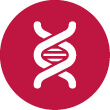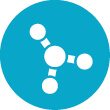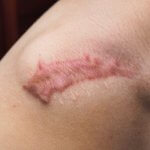Down’s syndrome is a genetic disorder caused by an abnormality, involving chromosome 21. The condition results in impaired cognitive development and a distinctive physical appearance. Scientists don’t yet truly understand the underlying cause of Down’s syndrome and in 94% of cases it likely simply to have been a fluke of nature.

In the UK, 2 babies are born with Down’s syndrome every day.

There are currently 60,000 people in Britain with the condition.

There are 3 types of test for Down’s syndrome.
How can I test for Down’s syndrome?
Currently there are three main types of test available and they can be broken down into two categories: screening and diagnostic testing. The Combined Test and NIPT are screenings and indicate the risk of a baby having Down’s syndrome, whereas Amniocentesis and CVS provide a definitive diagnosis.
Combined Test
This test is available to all expectant mothers from 10-14 weeks of pregnancy and gives a result based on a combination of the mother’s age, an ultrasound scan, and a blood test. The Combined Test has a detection rate of 90%, however, 1 in 20 positive results will be false. This means 5% of parents are left worrying without reason and may evening undergo the far riskier Amniocentesis or CVS tests unnecessarily as a result.
Non-Invasive Prenatal Testing (NIPT)
This newer kind of test is not yet available on the NHS, however, it can be requested through private clinics. It involves a simple blood test that analyses cell free DNA found in the mother’s plasma. NIPT offers a detection rate of >98% and up to a 0.01% false positive rate, making it far more accurate than the Combined Test.
Chorion Villus Sampling (CVS)/ Amniocentesis
These invasive tests follow a positive Combined Test or non–invasive screening and involve passing a fine needle through the mother’s abdomen to collected a sample of cells from either the placenta or surrounding fluid. Whilst both tests deliver an accurate diagnosis of the condition they are not without risk – the procedure carries a 1% chance of causing miscarriage.
Non-invasive prenatal testing with Cells4Life
There are a variety of NIPT services available that test for Down’s syndrome and much more. These include Panaroma, Harmony, NIFTY and Genesis Serenity
Cells4Life offer the Panoroma test as it is the most accurate Down’s Syndrome screening available, with a detection rate of >99%. It is also screens for several conditions that other tests do not, including triploidy, molar pregnancy and vanishing twin, and is the only test to differentiate between maternal and fetal DNA, resulting in a significant reduction is false positives.
The Panorama screens for the following conditions:

Chromosome Abnormalities:
-
- Trisomy 21 (Down syndrome)
- Trisomy 18 (Edwards syndrome)
- Trisomy 13 (Patau syndrome)
- Triploidy

Sex Chromosome Abnormalities:
- Monosomy X (Turner syndrome)
- Klinefelter syndrome
- Triple X syndrome
- XYY syndrome

Microdeletions:
-
-
- 22q11.2 deletion syndrome
- 1p36 deletion syndrome
- Prader-Willi syndrome
- Angolan syndrome
- Cri-du-chat syndrome
- Gender of the Baby (optional)
-
Learn more about non-invasive prenatal testing and our test for down’s syndrome on on our information pages.
References
Request a Welcome Pack
Find out more about cord blood banking by downloading a Welcome Pack now.







